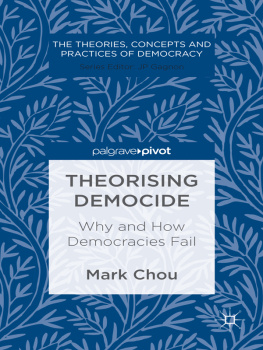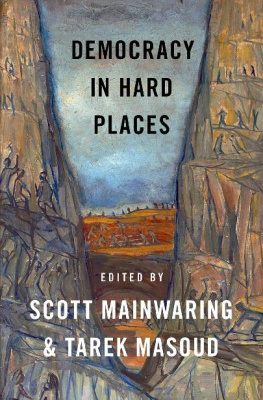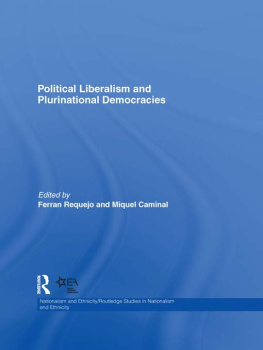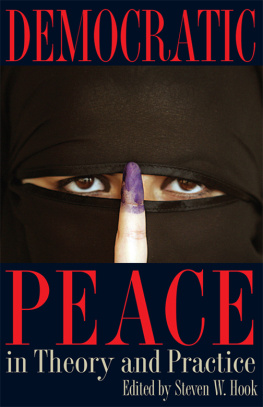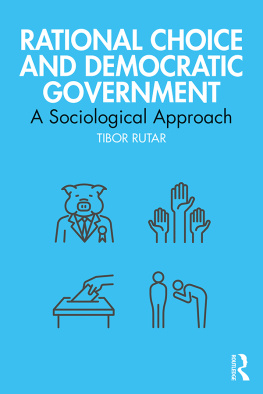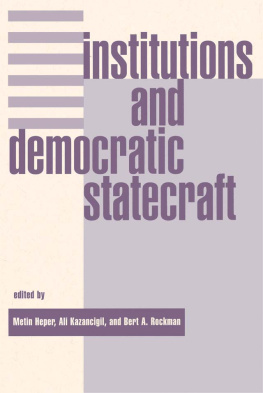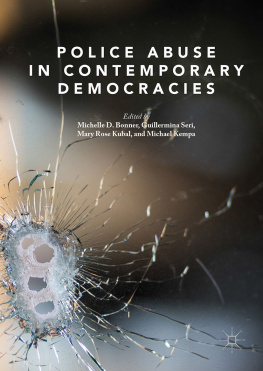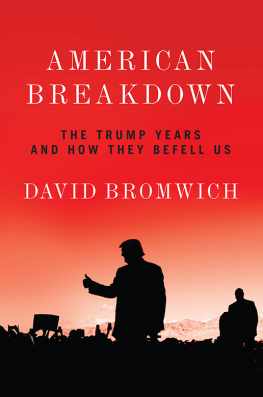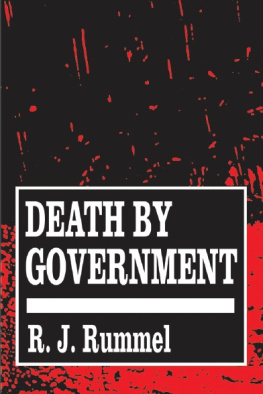Theorising Democide
The Theories, Concepts and Practices of Democracy
General Editor: Jean-Paul Gagnon, School of Political Science and International Studies and the School of Mathematics and Physics, University of Queensland, Australia
The discourse of democracy suffers from ambiguity: its literature is too vast and there is no codified understanding of its theories, concepts and practices. The uncertainties surrounding the meaning of democracy resulted in serious political problems for all levels of democratic government both historically and presently. The literature on democracy is so vast that it is highly improbable for one person to understand the core of this mass. Such an understanding is, however, needed to resolve the problematic ambiguity associated with democracy.
The aim of this book series is to define, analyse and organize democracys hundreds of theories, concepts and practices. The objectives, supporting this aim, are as follows:
Curate and consider works on democracy;
Identify and fill gaps in the literature on historical and contemporary democracies;
Find opportunities to synthesize or separate specific theories, concepts or practices of democracy.
Titles include:
Mark Chou
THEORISING DEMOCIDE
Why and How Democracies Fail
Ramin Jahanbegloo
DEMOCRACY IN IRAN
Jean-Paul Gagnon
EVOLUTIONARY BASIC DEMOCRACY
A Critical Overture
The Theories, Concepts and Practices of Democracy
Series Standing Order ISBN 9781137298171
(outside North America only)
You can receive future titles in this series as they are published by placing a standing order. Please contact your bookseller or, in case of difficulty, write to us at the address below with your name and address, the title of the series and the ISBN quoted above.
Customer Services Department, Macmillan Distribution Ltd, Houndmills, Basingstoke, Hampshire RG21 6XS, England

Theorising Democide:
Why and How
Democracies Fail
Mark Chou
Lecturer in Politics, School of Arts and Sciences,
Australian Catholic University


Mark Chou 2013
All rights reserved. No reproduction, copy or transmission of this publication may be made without written permission.
No portion of this publication may be reproduced, copied or transmitted save with written permission or in accordance with the provisions of the Copyright, Designs and Patents Act 1988, or under the terms of any licence permitting limited copying issued by the Copyright Licensing Agency, Saffron House, 610 Kirby Street, London EC1N 8TS.
Any person who does any unauthorized act in relation to this publication may be liable to criminal prosecution and civil claims for damages.
The author has asserted his right to be identified as the author of this work in accordance with the Copyright, Designs and Patents Act 1988.
First published 2013 by
PALGRAVE MACMILLAN
Palgrave Macmillan in the UK is an imprint of Macmillan Publishers Limited, registered in England, company number 785998, of Houndmills, Basingstoke, Hampshire RG21 6XS.
Palgrave Macmillan in the US is a division of St Martins Press LLC, 175 Fifth Avenue, New York, NY 10010.
Palgrave Macmillan is the global academic imprint of the above companies and has companies and representatives throughout the world.
Palgrave and Macmillan are registered trademarks in the United States, the United Kingdom, Europe and other countries.
ISBN: 9781137298690 EPUB
ISBN: 9781137298690 PDF
ISBN: 9781137298683 Hardback
A catalogue record for this book is available from the British Library.
A catalog record for this book is available from the Library of Congress.
www.palgrave.com/pivot
DOI: 10.1057/9781137298690
For my Mum
Contents
Acknowledgements
My sincere thanks to Jean-Paul Gagnon, editor of the Palgrave Studies in the Theories, Concepts and Practices of Democracy series, for inviting me to write this work; Amber Stone-Galilee and Andrew Baird, at Palgrave Macmillan, for taking on this project and seeing it through to completion; the generous support of the Faculty of Arts at the University of Melbourne for awarding me a Publication Subsidy Grant to help me to complete this book; Andrew Watts, at textedit, for adding a professional touch in editing and proofing the manuscript for publication; and finally to my family, friends and colleagues for their help and encouragement along the way.
Portions of this book have been inspired by and adapted from earlier works, including: Chou, Mark, Constituted to Fail: Dissecting and Celebrating Democratic Failure, Social Alternatives (Vol.31, No.1, 2012); and Chou, Mark, Sowing the Seeds of Its Own Destruction: Democracy and Democide in the Weimar Republic and Beyond, Theoria (Vol.59, No.133, 2012). I thank each publisher for their permission to include the content within this book.

Constituted to Fail: Democracy and Its Self-Negation
Abstract:Despite experiencing what for many commentators constitutes nothing short of a world-historical peak, democracy also finds itself enervated by a number of interminable ailments. Widespread governmental torpor, strongarm executives, declining levels of political bipartisanship and an apathetic political culture are just some of the factors said to be responsible for the democratic disillusionment and authoritarian nostalgia felt in certain parts of the world today. In response to these claims, the conventional position put forward by democratic advocates has been to view such democratic setbacks as an anomaly; at odds with the proper workings of democracy. This chapter challenges the prevailing wisdom and offers an alternative take on democracys failings. To do so, it critically reviews the recent works of a small minority of otherwise democratically committed scholars, before making the somewhat controversial claim that the fallibility of democracy is not now nor has it ever been an anomaly as much as a constitutive feature of democracy.
Chou, Mark. Theorising Democide: Why and How Democracies Fail. Basingstoke: Palgrave Macmillan, 2013.
DOI: 10.1057/9781137298690.
Of course, this was precisely the prediction made by those who first associated democracy with the so-called end of history thesis. Beginning with Bruce Russett, one of the intellectual forefathers of the now infamous democratic peace theory, we read that if history is imagined to be the history of wars and conquest, then a democratic world might in that sense represent the end of history. This, according to Fukuyamas prescriptions, is what has begun to happen with democracys rise to global prominence.
And although even Fukuyama would not dispute the claim that democracy is still a work in progress, a point which became especially pertinent as the postCold War optimism gave way to the post-9/11 pessimism, these projections do seem buoyed by the fact that there are now political reforms moving in a distinctly democratic direction in contexts where democratisation would have been impossible only a decade earlier. No single case is a better example of this trend than the democratic developments taking place within China, the worlds largest nation to have resisted democracys global spread thus far. Though it continues to be perceived by many Western powers as an outlaw regime potentially at odds with liberal democratic values and US hegemony, China has made significant strides when it comes to democracy in recent years. It may not yet be a democracy in the Western sense, and it may still have a questionable reputation when it comes to the issue of human rights, but there are recent advances which suggest that neither is it any longer a traditional totalitarian state.
Next page
